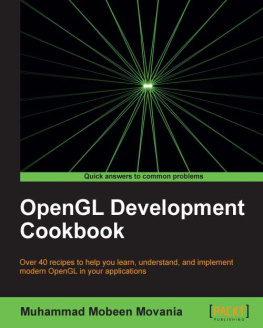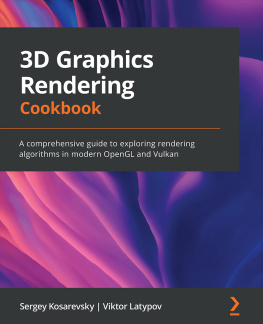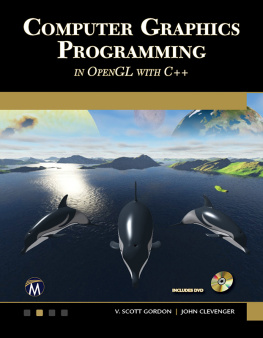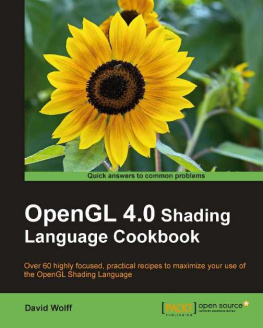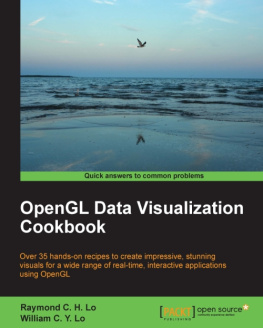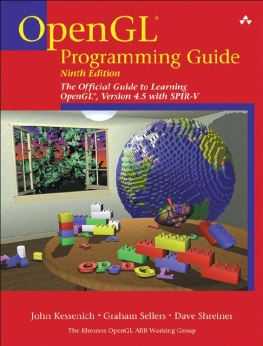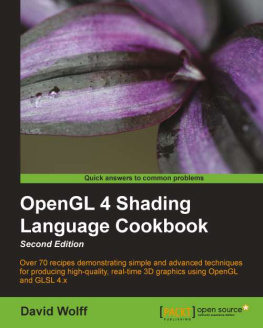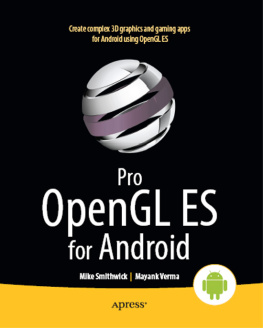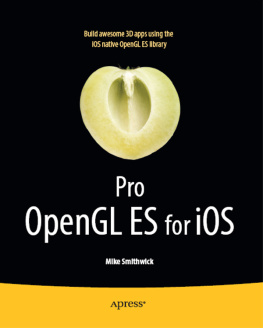Sharvari H. Baet
Ankita R. Meshram
Tejal R. Soni
About the Author
Muhammad Mobeen Movania received his PhD degree in Advance Computer Graphics and Visualization from Nanyang Technological Unviversity (NTU), Singapore. He completed his Bachelors of Science Honors (BCS(H)) in Computer Sciences from Iqra University, Karachi with majors in Computer Graphics and Multimedia. Before joining NTU, he was a junior graphics programmer at Data Communication and Control (DCC) Pvt. Ltd., Karachi, Pakistan. He was working on DirectX and OpenGL API for producing real-time interactive tactical simulators and dynamic integrated training simulators. His research interests include GPU-based volumetric rendering techniques, GPU technologies, real-time soft body physics, real-time dynamic shadows, real-time collision detection and response, and hierarchical geometric data structures. He authored a book chapter in a recent OpenGL book (OpenGL Insights: AK Peters/CRC Press). He is also the author of the OpenCloth project (http://code.google.com/p/opencloth), which implements various cloth simulation algorithms in OpenGL. His blog (http://mmmovania.blogspot.com) lists a lot of useful graphics tips and tricks. When not involved with computer graphics, he composes music and is an avid squash player. He is currently working at a research institute in Singapore.
I would like to thank my family: my parents (Mr. and Mrs. Abdul Aziz Movania), my wife (Tanveer Taji), my brothers and sisters (Mr. Muhammad Khalid Movania, Mrs. Azra Saleem, Mrs. Sajida Shakir, and Mr. Abdul Majid Movania), my nephews/nieces, and my new born baby daughter (Muntaha Movania).
About the Reviewers
Bastien Berthe is a young and passionate 3D programmer. Always attracted by 3D and video games, after a few years of studying in France, he went to the Sherbrooke University in Canada and received a postgraduate degree in Computer Science, specializing in real-time systems, 3D visualization, and video games development.
He is now working as a 3D Graphics Specialist Consultant at CAE (Montreal, QC) since 2012 and, more precisely, he is working on a new generation simulator's visualization system using mainly OpenSceneGraph and OpenGL.
CAE (http://www.cae.com) is a global leader in modeling, simulation, and training for civil aviation, defence, healthcare, and mining.
Dimitrios Christopoulos studied Computer Engineering and informatics at the University of Patras, Greece and holds a Master of Science (MSc) in Virtual Reality and Computer Graphics from the University of Hull in Great Britain. He started game programming in the '80s, and has been using OpenGL since 1997 for games, demos, European Union research projects, museum exhibits, and virtual reality productions. His research interests include virtual reality, human computer interaction, computer graphics, and games, with numerous publications in relevant conferences and journals. He coauthored the book More OpenGL Game Programming, Cengage Learning PTR and has also contributed to OpenGL Game Programming . He currently works as a virtual reality and 3D graphics software engineer producing games, educational applications, and cultural heritage productions for virtual reality installations.
Oscar Ripolles received his degree in Computer Engineering in 2004 and his Ph.D. in 2009 at the Universitat Jaume I in Castellon, Spain. He has also been a researcher at the Universit de Limoges, France and at the Universidad Politecnica de Valencia, Spain. He is currently working in neuroimaging at Neuroelectrics in Barcelona, Spain. His research interests include multiresolution modeling, geometry optimization, hardware programming, and medical imaging.
www.PacktPub.com
Support files, eBooks, discount offers and more
You might want to visit www.PacktPub.com for support files and downloads related to your book.
Did you know that Packt offers eBook versions of every book published, with PDF and ePub files available? You can upgrade to the eBook version at > for more details.
At www.PacktPub.com, you can also read a collection of free technical articles, sign up for a range of free newsletters and receive exclusive discounts and offers on Packt books and eBooks.
http://PacktLib.PacktPub.com
Do you need instant solutions to your IT questions? PacktLib is Packt's online digital book library. Here, you can access, read and search across Packt's entire library of books.
Why Subscribe?
- Fully searchable across every book published by Packt
- Copy and paste, print and bookmark content
- On demand and accessible via web browser
Free Access for Packt account holders
If you have an account with Packt at www.PacktPub.com, you can use this to access PacktLib today and view nine entirely free books. Simply use your login credentials for immediate access.
Preface
This book is based on modern OpenGL v3.3 and above. It covers a myriad of topics of interest ranging from basic camera models and view frustum culling to advanced topics, such as dual quaternion skinning and GPU based simulation techniques. The book follows the cookbook format whereby a number of steps are detailed showing how to accomplish a specific task and are later dissected to show how the whole technique works.

